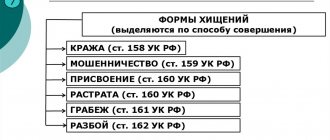Bribe: concept and types
A bribe in modern Russian legislation means the transfer of funds to any person for performing various actions, bypassing the current taxation system and the established procedure for the provision of services.
Also, bribery includes payment for the performance or non-performance of actions required by the official position of the bribe recipient, including for accelerating their execution, providing classified information or for committing other actions, including criminal ones. This concept is regulated by Articles 290, 291, 291.1 and 291.2 of the Criminal Code of the Russian Federation. Moreover, in most cases, with the exception of Art. 291.2 of the Criminal Code of the Russian Federation, which provides for punishment for petty bribery, the concept of a bribe applies exclusively to officials. In current Russian legislation, officials are defined as persons holding government positions, working in budgetary organizations, being in the military and other public service, or being heads of state-controlled companies.
Bribery is a criminal offense and carries a wide range of different penalties, which may include:
- A fine in a fixed amount of up to 5 million rubles, several, up to 100 amounts of the bribe paid, or in an amount equal to the income of the criminal for a certain time, up to 5 years;
- Imprisonment or restriction of freedom for up to 15 years;
- Deprivation of the right to occupy certain positions and conduct specific activities for up to 15 years;
- Correctional labor for up to 3 years.
Important fact
A bribe can only mean the transfer of property. Thus, the legal regulation of this concept leaves room for speculation in services and moral rights with the possibility of avoiding criminal prosecution.
The concept of a bribe is spelled out in Article 290 of the Criminal Code of the Russian Federation. According to it, a bribe is usually understood as the receipt by a public person of a certain amount of money/securities/personal property/services as payment for certain manipulations/inaction at the request of the bribe-giver.
Info
According to the current Criminal Code of the Russian Federation, the person receiving a bribe is usually called the bribe-taker, and the person giving the bribe is called the bribe-giver.
In other words, the bribe-taker, having certain powers or influence in certain areas, promises to fulfill certain requests of the bribe-giver, or “turn a blind eye” to certain actions, for a fee/providing a counter service.
According to the Criminal Code of the Russian Federation, not every transferred amount (or valuable property for a certain amount) is considered a bribe. Thus, it is customary to distinguish:
- A small bribe not exceeding twenty-five thousand rubles;
Info
A bribe is considered not only the transfer of a certain amount of money, but also the transfer of securities and personal property of a certain value.
- A bribe in a significant amount, which exceeds twenty-five thousand rubles;
- A large bribe not exceeding one hundred and fifty thousand rubles;
- A particularly large bribe, exceeding one million rubles;
Unfortunately, today in Russian legislation there is no definition of the size of the minimum bribe. What does it mean? Any amount of money given to another person can be considered a bribe. In this case, it must be proven that in exchange for receiving a bribe, the official performed some actions of the bribe giver, or allowed him to commit some illegal actions, receiving a monetary reward for silence.
Info
The judge may refuse to initiate legal proceedings if the amount of the bribe, in his opinion, turns out to be too small (for example, five hundred rubles).
However, the situation is somewhat different with the transfer of material assets. Thus, according to Article 575 of the Civil Code of the Russian Federation, a government entity does not have the right to accept material assets, even as a gift, whose value exceeds three thousand rubles.
Those. a gift in an amount exceeding three thousand rubles is automatically considered to be receiving/giving a bribe and is accompanied by criminal prosecution.
According to the provisions of the Criminal Code, a bribe is understood as the receipt by an official of any state or municipal body (the bribe-taker) of remuneration in the form of funds, valuables, material goods or the provision of services for the performance of specified actions or refusal to perform them (inaction) in favor of the person who provides this reward (the bribe giver).
The action or inaction performed for this remuneration must necessarily be within the official competence of the official, and may also consist of patronage or connivance in the service, as well as in providing assistance in resolving other issues that are not within the competence of the bribe taker, but in making decisions on which he may influence.
Punishment under the Criminal Code of the Russian Federation directly depends on the size of the bribe and a number of circumstances, for example, whether the bribe was a payment for illegal actions or was a kind of “gratitude” for the performance of one’s duties by an official.
Bribes are also distinguished by their amount, which is of particular importance for the qualification of the crime. The amount of a bribe is determined in rubles not only when it is given or received in the form of cash or payments to an account, but also when securities, material assets are transferred to the bribe recipient, or services are provided. The Criminal Code of the Russian Federation (note to Article 290, also valid for other “corruption” articles) distinguishes:
- Bribes in a significant amount, i.e. exceeding 25 thousand rubles.
- Bribes on a large scale, i.e. more than 150 thousand rubles.
- Bribes on an especially large scale, i.e. exceeding 1 million rubles.
Contrary to the common misconception in disputes about what amount is a bribe, there is no minimum amount of a bribe in the legislation - in fact, any amount can be considered a bribe if the bribe is given in the form of money. The investigation or the court has the right to terminate the criminal prosecution due to its insignificance, when the bribe, for example, does not exceed 500 rubles, but in practice such cases are extremely rare.
The situation is a little different with material goods and values. Art. 575 of the Civil Code of the Russian Federation establishes a direct ban on donating various valuables to officials in connection with the performance of their assigned duties, excluding ordinary gifts. Ordinary gifts are understood as items and valuables whose price does not exceed 3,000 rubles.
What is the giving of a bribe?
It can take various forms, both tangible and intangible. The list of items offered can include anything from cash to real estate. Services are also varied: tourist trips, medical care, construction work. They are provided free of charge or at reduced prices.
The exception is gifts. Article 575 of the Civil Code of the Russian Federation allows state and municipal employees to be given pleasant surprises worth no more than three thousand rubles
. If the price is higher, then the official is obliged to transfer the received property to the state. The value of the gift will not matter if the official performs certain actions or inactions in return. Such an offering will already be considered a crime.
Important! A bribe is a transaction in which two parties take part, but not always both of them are interested in committing illegal actions. Depending on the situation, the one who tried to bring the criminal matter to an end will have to answer according to the law.
Legal regulation of the concept of a bribe and responsibility for receiving or giving it
Liability for perjury
When preparing evidence of extortion, the victim must remember the responsibility for giving false testimony. Also, if a forensic examination has been ordered, you need to know that
the expert is liable for giving a knowingly false conclusion
By
Article 307 of the Criminal Code of the Russian Federation
. In both cases, punishment can be in the form of a fine - up to 80 thousand rubles, compulsory labor - up to 480 hours, correctional labor - up to 2 years, arrest - up to 3 months.
- record a conversation in which a bribe is discussed on a voice recorder or video camera. Despite the fact that these recordings cannot serve as official evidence in court, they will still prompt law enforcement officials in the direction of action;
- try to talk with the extortionist in the presence of witnesses;
- keep receipts or other documents related to the bribe. For example, a veiled bribe in honey. The institution may be required to pay for any expensive drugs that should be provided free of charge. Confirmation of extortion in this case will be checks, receipts or other documents certifying payment for this medicine;
- In case of extortion with the use of violence, it is necessary to conduct a medical examination of the damage caused to health.
In addition to the above, the victim, when extorting a bribe, should not contradict the extortionist, but agree on the next meeting to transfer the money. Next, you need to submit an application to the relevant government agencies, as described earlier, and entrust law enforcement agencies to fulfill their professional duties.
Have a question about what to do when extorting a bribe? Ask it in the comments
The legislation provides for the possibility of exemption from criminal or any other liability for giving a bribe, subject to assistance in solving such a crime. Thus, you can avoid criminal punishment by reporting the fact of a crime voluntarily to law enforcement agencies, as well as by helping to solve or directly investigate the crime committed, or in cases where there was direct extortion of funds by an official.
At the same time, the Criminal Code does not provide for the possibility of avoiding liability on the part of the recipient of a bribe. Thus, the person giving the bribe is always in a more advantageous position from the point of view of legislation and jurisprudence, since he has the right to report the commission of a crime after the fact of its occurrence and completely relieve himself of all responsibility for such an offense.
Important fact
In order to avoid liability for giving a bribe, reporting a crime must be exclusively voluntary and must be submitted before law enforcement authorities initiate a criminal case against the reporting person. In the event that criminal proceedings regarding the transfer of a bribe have already been opened under Art. 291 or 291.2 of the Criminal Code of the Russian Federation, removal of liability is permissible only in the case of active assistance in the investigation or disclosure of the fact of a bribe.
Also, an important fact of qualifying bribery as a criminal offense is the direct giving of a bribe, while its offer, even recorded by legal methods, does not contain a crime and cannot entail criminal prosecution. The only exceptions are cases of offering mediation in the transfer or receipt of unlawful benefits.
In general, liability for giving a bribe is provided for by law in very large amounts, but the Criminal Code leaves the possibility of not being held liable if such actions were forced. Also, Russian legislation still practically does not regulate bribery in commercial structures, which can remain unpunished in the absence of other criminal offenses.
Despite the fact that the document seized from the bribe-giver contained signs of forgery, the investigation was unable to establish that he knew about its forgery. Consequently, since it has not been proven that at the time the police officers checked the documents, the bribe-giver knew about the falsity of his document, it is also unproven that he could ask an official to commit a KNOWLEDGELY ILLEGAL action (inaction).
According to the defense, the actions of the bribe giver should be considered as giving a bribe without qualifying criteria (Part 1 of Article 291 of the Criminal Code of the Russian Federation), the commission of which is punishable by up to 2 years in prison with a fine of ten times the amount of the bribe, and not under Part 3 of Article 291 The Criminal Code of the Russian Federation provides for punishment of up to 8 years in prison with a fine of thirty times the amount of the bribe.
Do not call a spade a spade, speak allegorically, it is possible that the same traffic police inspector is having a month to combat bribery and he needs, with your help, to carry out a plan to catch bribe-payers at his post. The games are over. Try not to transfer cash either in documents or in an envelope. It is better to organize the process without transferring cash at all.
With the modern development of various means of communication, you can easily transfer money to him using your smartphone to his bank card. But if a bribe is specifically extorted from you, these are completely different rules of the game - here the main thing becomes to collect more evidence about the fact of extortion.
Info
The entire law enforcement system created today, without exception, is interested in “imprisoning bribe takers.” Not in justice, but specifically in “landings”. Thus, a citizen accused of a bribe remains alone, face to face, with the System serving the state.
Any state is always stronger than any citizen. Therefore, a citizen accused of bribery does NOT have the slightest chance of remaining free. Dot. – So, what should honest people do, those who can simply be slandered or “framed”? The answer of those already convicted of bribery is this: “Before holding a position, you need to learn to understand people in general, and especially carefully those who you have to trust.”
- Do you want power? Be prepared for lies, slander and slander against yourself, plus tons of dirt on your family.
Attention
An official from the Tver region - about the experience he experienced during the investigation and trial. This article was written by a person who experiences what was written from his own bitter experience, a former major Tver official who fell into the millstones of the law enforcement system. It is about him that we are sure that he was caught unfairly.
But this does not change the essence; now he is in prison. It seemed to us that this man’s experience would be useful to those who have not yet realized that they are under the gun.
In particular, this article can open the eyes of Governor Shevelev’s team and save them from some mistakes. The high-profile cases of exposing corrupt officials that we see on TV constitute only a small part of the “landing” process. The bulk of those “jailed” for corruption crimes are “infantry” - ordinary public sector employees and their petty bosses - “bumps and pimples.”
The proof is based on the absence of evidence, any relationship between persons that suggests the transfer of a significant amount of money. So, for example, if at the time of transfer of a certain amount one of the parties had a purchase and sale agreement in hand, it will be more difficult to prove the receipt of a bribe.
There will be testimony from witnesses who report that one party needed some actions or inactions from the other party and thereby received an offer in the form of a reward. In conclusion, it should be noted that taking a bribe is a fairly serious crime for which they are subject to punishment and criminal liability.
And the bribe-taker will be roughly punished, and most likely, will definitely lose his position. Collecting evidence So, let's figure out what can serve as evidence of extortion and transfer of a bribe to an official. If you can simply record a doctor in a hospital, a teacher at a school or institute, as well as a traffic police inspector on a phone or voice recorder, you won’t be able to do this with a large office official.
Here the investigative authorities can already help and, for example, mark the transferred bills, send their employee under the guise of a negotiator, and so on. This is such a movie. Traditional evidence of the fact of a bribe will be video and audio recordings made both at the time of discussion of the agreement on the conditions of giving a bribe, and at the moment of the very fact of its transfer. Investigative authorities and the court will definitely hear witnesses who can say something about the case.
Giving a bribe to officials (including foreign officials) is prohibited by the Criminal Code of the Russian Federation and liability for this act is prescribed in Art. 291 of the Criminal Code of the Russian Federation. In this case, liability occurs regardless of the method of transferring the bribe - it can be either personal contact with the bribe recipient or the transfer of illegal remuneration through third parties (intermediaries).
Established in Part 3, the deliberate illegality of the actions for which a bribe is given implies that the bribe-giver understands and is aware of the illegality of the behavior that he demands from an official: a police officer, a doctor, a teacher, a government employee. institutions, etc.
Exemption from liability for giving a bribe
At the same time, as in Art. 290 and 291 of the Criminal Code of the Russian Federation, mediation in bribery for the execution of actions that are obviously contrary to the law is punished more severely, reaching fines in the amount of 60 times the amount of the bribe or a prison term of up to 7 years.
Promising assistance in transferring or receiving a bribe, when the person actually had the opportunity to fulfill his communication, is also punishable. Deception, that is, misleading the bribe giver or bribe recipient about their connections and capabilities cannot be qualified under Art. 291.1 – most often such actions fall under fraud.
We suggest you read: How to properly process the purchase of a house with land
The law allows intermediaries to avoid liability provided that they voluntarily report to law enforcement agencies the fact of giving or receiving a bribe, and also provide maximum assistance in solving the crime.
In cases where you actually gave a bribe to an official for committing a deliberately illegal act and the bribe was given on your initiative, all that remains is to provide maximum assistance to the investigation, admit guilt and hope for a reduction in punishment.
When, in your opinion, there was extortion of a bribe by an official, it is necessary to prove this at any cost - with witness testimony, audio-video recordings, testimony and explanations.
Remember that charges of bribery can only be brought by law enforcement agencies according to their competence. Unsubstantiated statements, for example by an opponent in a dispute in court, that you gave a bribe to someone are void and can be punished under the article “Slander”.
During the preliminary investigation, it is necessary to prove the listed circumstances.
Regardless of the category of the crime committed, it must be proven by the totality of the collected evidence. Initially, a person will be suspected of committing a crime; after evidence is collected, they can be charged.
Proof of receipt of a bribe can be made on materials that were obtained during operational investigative activities: the result of an operational experiment.
Important! The accusation can be built on the basis of the listed data, provided that they were obtained in compliance with the current legislation.
— Are the forms and methods of committing corruption crimes changing?
— Indeed, a significant problem in the fight against corruption is the low detection of this type of crime, especially high-profile ones - those committed by high-ranking officials.
— What do you see today as the main practical difficulties in investigating official crimes and corruption?
— The most difficult cases to investigate seem to be criminal cases involving crimes committed in conditions of non-obviousness, when there is no objective evidence of guilt, or cases of crimes committed by an organized group, a criminal community.
— What mistakes do investigative and operational workers make when identifying crimes and investigating criminal cases?
How can investigators correct these errors? How should prosecutors respond to these mistakes? Are fatal errors common?
— How frequent (or rare) are cases of criminal cases being initiated for provoking bribes? — In recent years, there has indeed been an increase in the number of acquittals and dismissed criminal cases, where judges and investigators motivated their decisions by the provocation of a bribe. Ramazanov Islam Ramazanovich, editor-in-chief of the magazine “Criminal Procedure”
○ Provocation of a bribe.
Protecting the interests of conscientious officials who have not yet been swallowed up by widespread corruption, the Criminal Law, Article 304 of the Criminal Code of the Russian Federation, punishes persons who provoke a bribe - that is, who transfer funds or other things that fall under the definition of a bribe to an official without his consent or by doing so in order to denigrate him, to create a false impression of the crime he allegedly committed.
It is important that the official must not agree to receive a bribe and must refuse the provocateur to fulfill his request. Money may be placed on the table, in documents or thrust into the pocket of an official, but he must not perform any actions that even indirectly indicate consent to this. Provocation of a bribe entails liability in the form of a prison term of up to 5 years, or a fine of up to 200 thousand rubles.
How to avoid becoming a victim of bribery provocation if you are an official? Just don't take bribes! Any attempts at bribery should be reported to your superiors immediately, as required by job descriptions and the law.
Example: Citizen A., having received repeated refusal from the traffic police inspector to return his driver’s license and not draw up a report, put 15 thousand rubles in three 5 thousand bills on the seat and left the inspector’s car, inviting him to think, while he himself called the hotline police line and reported bribery.
Recommendations for collecting evidence of extortion
rub.;
- large size - over 150 thousand
rubles; - especially large size - over one million rubles.
Such a distinction had to be introduced in order to aggravate the punishment for both receiving and giving a bribe. The size of the bribe determines the severity of the crime.
In turn, both the punishment and the period after which the crime will not be considered such due to the prescription of years will depend on this. This crime is also classified depending on the time of the crime.
- gratitude is what is given after the action is completed.
- bribery – something given before the act is performed;
But the composition of the crime does not change depending on the time the illegal act was carried out.
. Typical situations at the initial stage of the investigation and the actions of the investigator Usually, in cases of bribery at the beginning of the investigation, the following general typical versions are put forward: · bribery actually took place under the circumstances that are set out in the materials that served as the basis for initiating a criminal case;
There is a statement from the bribe-giver, and he is ready to assist in exposing the bribe-taker, who does not know about it.
2. The bribe giver and the bribe taker act in collusion; information about the crime came from operational sources; bribe takers do not know about this.
3. Information about the facts of bribery came from official sources.
Bribe takers know that law enforcement agencies are interested in their actions.
Taking into account completeness and reliability, primary information about bribery can be divided into two groups: a) information that does not require additional verification and b) information that requires the production of such.
The first group of information contains information directly indicating bribery. In this case, there are no circumstances precluding proceedings in the case.
In such cases, there is no need to replenish the existing material.
We should not forget that the law obliges us to equally prove both incriminating and exculpatory circumstances; therefore, both the refusal to initiate a case and its termination must be justified. As mentioned above, the subject of analysis of received information about a bribe and preliminary verification is to clarify the legality of the reason for initiating a criminal case. The reason for initiating a criminal case for bribery can be any of those specified in Article 140 of the Code of Criminal Procedure.
An analysis of judicial and investigative practice shows that the most common reason for initiating cases of bribery are statements and letters from citizens.
The legal grounds for carrying out an operation to capture a bribe-taker red-handed are Art.
Articles 144, 145, 146, 223 of the Code of Criminal Procedure of the Russian Federation. In accordance with the requirements of Article 144 of the Code of Criminal Procedure of the Russian Federation, the investigator and the inquiry body are obliged to accept and consider applications for any crime, not only a crime committed, but also an impending one.
Such an on-site check makes it possible to objectively verify whether the statement of bribery is confirmed or not, allows you to expose an official for receiving a bribe, or protect him from discredit or unfounded suspicion of bribery.
Information about the wanted property of bribe takers can be obtained from various sources: messages from neighbors, colleagues, acquaintances, relatives, various organizations and institutions (banks, pawnshops, thrift stores, etc.).
From the results of the study of practice, it follows that during the verification of a report of bribery, the following operational investigative measures were carried out: E) Operational experiment.
We invite you to read: Time limits for consideration of administrative cases by justices of the peace
The Criminal Code provides for serious differences in liability for bribery, depending on the circumstances and the amount of illegally transferred amounts. So, under petty bribery, which is regulated by the existing provisions of Art. 291.2, implies the transfer, both to an official and to any other persons, of bribes in amounts up to 10 thousand rubles.
Important fact
Transfer of bribes to non-officials, i.e. persons not in public service, including foreign ones, are regulated exclusively by Art. 291.2, which gives rise to certain legal conflicts.
By a significant amount of a bribe, the Criminal Code means the transfer of money, securities and other valuables, as well as other property rights in an amount greater than 25 thousand rubles. A large amount is qualified when the bribe amount is more than 150 thousand rubles, and a particularly large amount concerns the transfer of funds in an amount exceeding 1 million rubles.
At the same time, in general, the amount of punishment for giving a bribe is less than for receiving it in similar amounts, since the legislation provides for a higher level of responsibility of officials for such crimes. In particular, the concept of petty bribery is applicable only to the persons giving the bribe. Recipients of bribes are punished in accordance with the provisions of Art. 290 of the Criminal Code of the Russian Federation.
Legislative regulation
Liability for bribery in medicine and the procedure for determining punishment are regulated by:
- Criminal Code;
- Resolution of the Plenum of the Supreme Council No. 24;
- Labor Code.
The types of punishment for accepting a bribe by a health worker are listed in Art. 290 of the Criminal Code, the responsibility of patients for giving a bribe is described in Art. 291 of the Criminal Code , and the penalties charged to both parties in the case of bribery in small amounts (up to 10 thousand rubles) are given in Art. 291.2 of the Criminal Code.
Judicial practice in imposing penalties for bribery is regulated by the Resolution of the Plenum of the Armed Forces of the Russian Federation, and Art. 81 of the Labor Code establishes the possibility of dismissing a doctor convicted of bribery.
It is important to note that gifts can only be given to those employees of medical institutions who provide only medical services and do not make decisions about the legal status of the patient - they do not issue sick leave and are not members of medical commissions that decide questions about the professional suitability or disability of patients.
○ How to distinguish a bribe from commercial bribery?
Commercial bribery refers to the receipt of money or material assets by a person working in a commercial organization and having managerial authority in exchange for performing some action in favor of the person offering the reward.
The main difference between a bribe and commercial bribery: a bribe can only be given to an official working for state or municipal bodies, while bribery can only be committed in the commercial sphere.
Responsibility for commercial bribery, both for receiving and for committing it, is spelled out in Art. 204 of the Criminal Code of the Russian Federation. The conditions for exemption from liability are similar to bribery - voluntary surrender to the authorities and assistance in the investigation of the case.
Two sides of the same crime
The Criminal Code of the Russian Federation specifies two types of crimes in which the fact of a bribe is present: receiving remuneration (Article 290) and providing it (Article 291). This division was not made by chance, because not always both parties have the same desire to commit an illegal act. An official may demand money from a visitor in exchange for performing those actions that he must perform anyway due to his direct duties. And vice versa, an official does not want to break the law, but he is persistently asked to do so. In such cases, the attacker is the person who initiates the bribe procedure.










